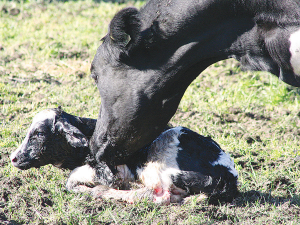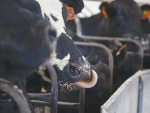Most farms arrange for them to be checked at least every 6 hours and sometimes more often, especially in poor weather.
Check springers for signs of labour regularly, quietly, and thoroughly and record what you observe.
Quietly
Walk quietly through the springer mob – when cows are feeding is best. Don’t walk through the mob when cows are hungry and are waiting to be moved to fresh grass or a new break. Look for cows that are showing signs of labour and try not to disturb them.
Regularly
Check cows at least four times a day. Create a routine for springer checks.
Thoroughly
Check all areas of the paddock, and depending how good the fencing is, check the paddocks next door as well. Check drains, hollows, long grass, hedges – anywhere a calf could be hiding.
Record
Note the number of any cow or heifer that has started to show signs of calving, or has calved, and report to your team so you can keep an eye on her progress.
Early signs of labour
- Springing up - swelling of udder
- Milk dripping from teats
- Mucus string from vulva
- Restlessness
Stages of labour
Calving will progress at different rates for different cows. Some may show many signs whereas others may show very few signs.
Generally, labour can be broken into three stages: preparation for labour, delivery, and cleaning.
Preparation for labour
Look for these signs when observing springers:
- isolated from herd and reduced appetite.
- pelvic ligaments relaxed - vulva looks swollen and flabby
- dip between tailhead and pin-bones
- tummy less full as calf moves into birth canal/birthing position
- mothering other cows' calves
- discomfort - swishing tall, arched back, restless, peeing, kicking and nosing at her side, tail raising.
- straining/contractions
- water bag protruding
Delivery
Cows should take 30 minutes to one hour to calve – no more than two hours. Heifers should take two to three hours to calve – no more than four hours.
Cleaning
The cleaning process is where the cow’s uterus sheds all material related to pregnancy and returns to its normal size. This process is necessary for the cow to return to normal cycling behaviour and improve her chances of becoming pregnant again in the future. It includes:
- The placenta will normally be shed within six hours of birth.
- The uterus then begins to shrink back to normal size.
- If only a small part of the placenta comes away, record this and let your manager know.
- Don't pull on the placenta - this can damage the uterus and is painful for the cow.
DairyNZ











